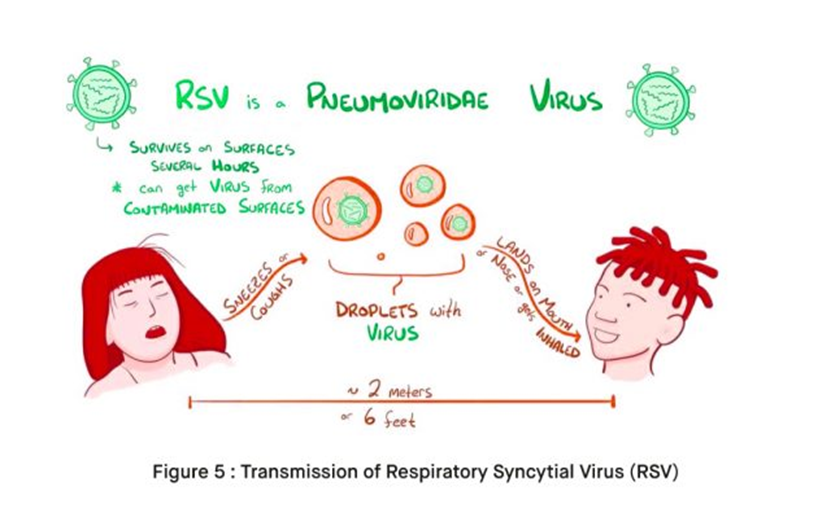A nurse is assisting with the admission of an infant who has respiratory syncytial virus (RSV), which of the following rooms should the nurse assign the infant?
A room with a toddler who has pneumonia
A private room with reverse isolation
A private room with contact/droplet precautions
A room with an infant who has croup
The Correct Answer is C
A. A room with a toddler who has pneumonia.
This option is not ideal because both RSV and pneumonia are respiratory infections that can spread to other patients. Placing these two patients together could increase the risk of cross-infection.
B. A private room with reverse isolation.
Reverse isolation is typically used to protect immunocompromised patients from acquiring infections from others. However, in the case of RSV, reverse isolation is not necessary because RSV primarily affects infants and young children who are generally not immunocompromised. Therefore, this option is not appropriate for an infant with RSV.
C. A private room with contact/droplet precautions.
This option is the most appropriate. RSV is primarily spread through respiratory droplets and direct contact with respiratory secretions. Placing the infant in a private room with contact/droplet precautions helps to minimize the risk of transmission to other patients. Healthcare workers and visitors entering the room should adhere to appropriate precautions, including wearing personal protective equipment (PPE) such as masks, gloves, and gowns.
D. A room with an infant who has croup.
Placing an infant with RSV in the same room as an infant with croup is not ideal because both conditions involve respiratory symptoms and may increase the risk of cross-infection.

Nursing Test Bank
Naxlex Comprehensive Predictor Exams
Related Questions
Correct Answer is A
Explanation
A. Machine-like murmur.
This option is correct. A characteristic clinical manifestation of a large patent ductus arteriosus is a continuous "machine-like" murmur heard on auscultation. This murmur is typically heard best at the upper left sternal border and may radiate to the back.
B. Chronic hypoxemia.
Chronic hypoxemia is not typically a primary manifestation of a large PDA. While PDA can lead to increased pulmonary blood flow and potentially contribute to pulmonary congestion, chronic hypoxemia may not be a prominent feature unless complications such as heart failure develop.
C. Cyanosis with crying.
Cyanosis with crying is more commonly associated with cyanotic congenital heart defects such as tetralogy of Fallot. While PDA can contribute to cyanosis in certain circumstances, it is not typically a consistent clinical manifestation.
D. Weak pulse.
A weak pulse is not typically associated specifically with a large PDA. Infants with PDA may have bounding pulses due to increased blood flow through the ductus arteriosus.
Correct Answer is B
Explanation
A. Onlooker play:
Onlooker play is when a child observes others playing without actively participating themselves. This type of play typically involves watching others engage in activities or play without joining in. It does not directly involve role-playing or hands-on activities to prepare a child for surgery.
B. Therapeutic play:
This is the correct answer. Therapeutic play involves using play activities to help children express their feelings, fears, and concerns about medical procedures or hospitalization. It often includes role-playing and hands-on activities such as practicing medical procedures on dolls or stuffed animals. Therapeutic play helps children become familiar with medical equipment and procedures in a non-threatening environment, reducing anxiety and promoting coping skills.
C. Cooperative play:
Cooperative play involves children playing together, interacting, and collaborating in shared activities. While cooperative play can be beneficial for social development, it does not necessarily involve role-playing or hands-on activities specific to preparing a child for surgery.
D. Play therapy:
Play therapy is a form of psychotherapy that uses play to communicate with and help children express their thoughts and emotions. While play therapy can be therapeutic for children dealing with various issues, including medical procedures, it is typically facilitated by a trained therapist rather than being directly utilized to prepare a child for surgery through role-playing or hands-on activities.
Whether you are a student looking to ace your exams or a practicing nurse seeking to enhance your expertise , our nursing education contents will empower you with the confidence and competence to make a difference in the lives of patients and become a respected leader in the healthcare field.
Visit Naxlex, invest in your future and unlock endless possibilities with our unparalleled nursing education contents today
Report Wrong Answer on the Current Question
Do you disagree with the answer? If yes, what is your expected answer? Explain.
Kindly be descriptive with the issue you are facing.
